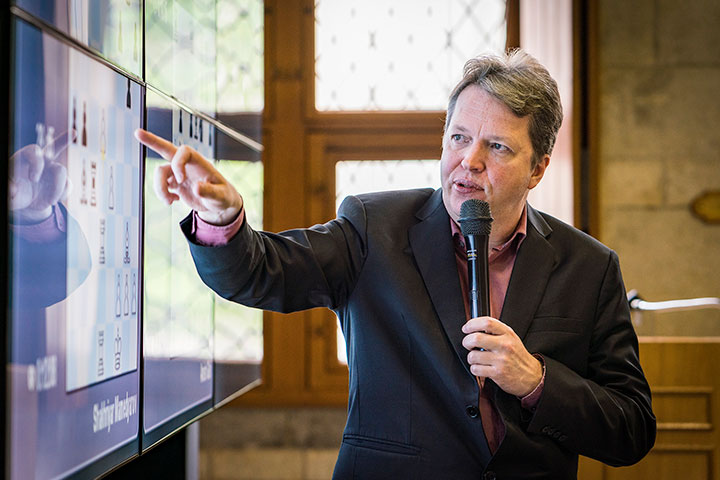


Nigel Short takes us on an electrifying journey through a very rich chess career, which saw him beat no less than twelve world champions. His experience in tournaments and matches all over the world – Short has visited a total of 89 countries – can be seen in the narratives that precede the games which he annotates with humour and instructive insights.
Why is Nigel Short running for FIDE President? How does he expect to challenge the incumbent team of Georgios Makropoulos, particularly now that his countryman Malcolm Pein has joined the "Makro" ticket? Can FIDE be reformed, and what does Short consider it a priority to change?
These are some of the questions I hoped to answer in an hour-long interview with the former World Championship challenger and global chess ambassador. In collaboration with Ben Johnson's Perpetual Chess podcast, I sat down with Nigel in his hotel room in Leuven, Belgium, the morning before the fifth and final day of the "Your Next Move Rapid and Blitz" tournament, where Nigel provided live commentary for local chess fans at the Leuven City Hall.
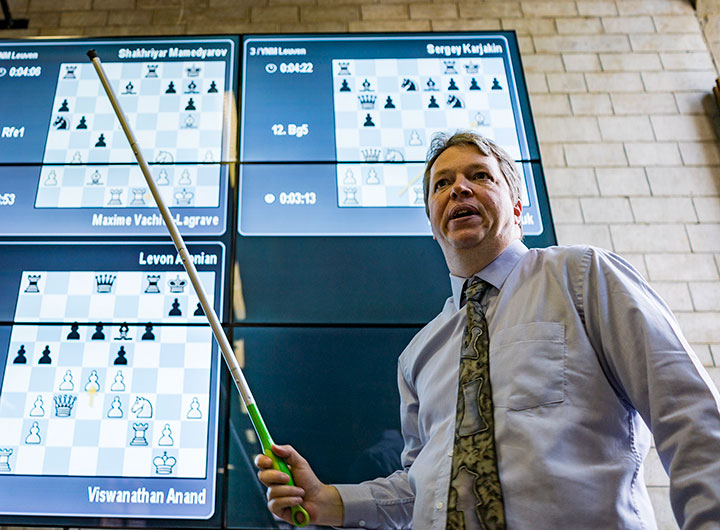
Long stick, Short commentary in Leuven's City Hall | Photo: Lennart Ootes / Grand Chess Tour
During the tournament, news broke that the Russian Chess Federation is now supporting Arkady Dvorkovich, a former member of its board, for FIDE President. Dvorkovich, the son of International Arbiter Vladimir Dvorkovich, is the Chairman of the organizing committee of the FIFA World Cup 2018 in Russia. He previously served as Deputy Prime Minister in Dmitry Medvedev’s Cabinet from 2012 until 2018. And during that time he was also the Chairman of the organizing committee of the 2014 World Chess Championship Match in Sochi.
In the initial news report, Dvorkovich is quoted as saying that he was entering the race, “after consulting with the country’s leadership…” indicating that he will have the backing of the Russian government and its diplomatic core, which is widely seen as having played a role in Ilyumzhinov's previous electoral successes.
Below are some highlights of our conversation and you can also listen to the full audio or subscribe to the podcast.
Nigel Short refers to his opponent Georgios Makropoulos as the "continuity candidate" and argues that they if they really wanted to reform FIDE, such as by enacting term limits, they would have done so by now.
"All of the team, apart from Malcolm Pein, owe their positions to their fealty to Kirsan Ilymzhinov. They are the people — particularly Makropoulos — who have sat by Kirsan whilst he’s lied to the General Assembly with his false promises...After 15 years of Kirsan being in power, the Presidential Board — actually led by Makropoulos — vetoed a proposal of the Ukrainian federation. It was there before the General Assembly and the Presidential Board recommended to the General Assembly that they ignore that. Just because it’s politically expedient of him to present something new now doesn’t mean there’s a real change of heart."
Short believes that other ambitious members of Makropoulos' team have pushed for the adoption of term limits to ensure they have a chance to run for President in the next election cycle without an incumbent "in the way".
"Malcolm Pein has already been speaking about running in 2022 — that is assuming the Makropoulos team wins, which is very very far from being a foregone conclusion — but the idea that this group of people are just going to anoint Malcolm as their new leader, President, or whatever is absurd. There are very ambitious people in that group and there will be a hell of a fight. So my dear countryman I think is allowing himself to be used, and I think he is very naive, to be honest. He has been around in chess all his life, as a journalist and many many [other] things, of course, he’s been doing the London Chess Classic and all sorts of things, but as regards FIDE politics he’s relatively new...He's the only one there that is a fresh face and it's very important for them to try to distinguish themselves from Kirsan continuity. So they give him space and encourage him."
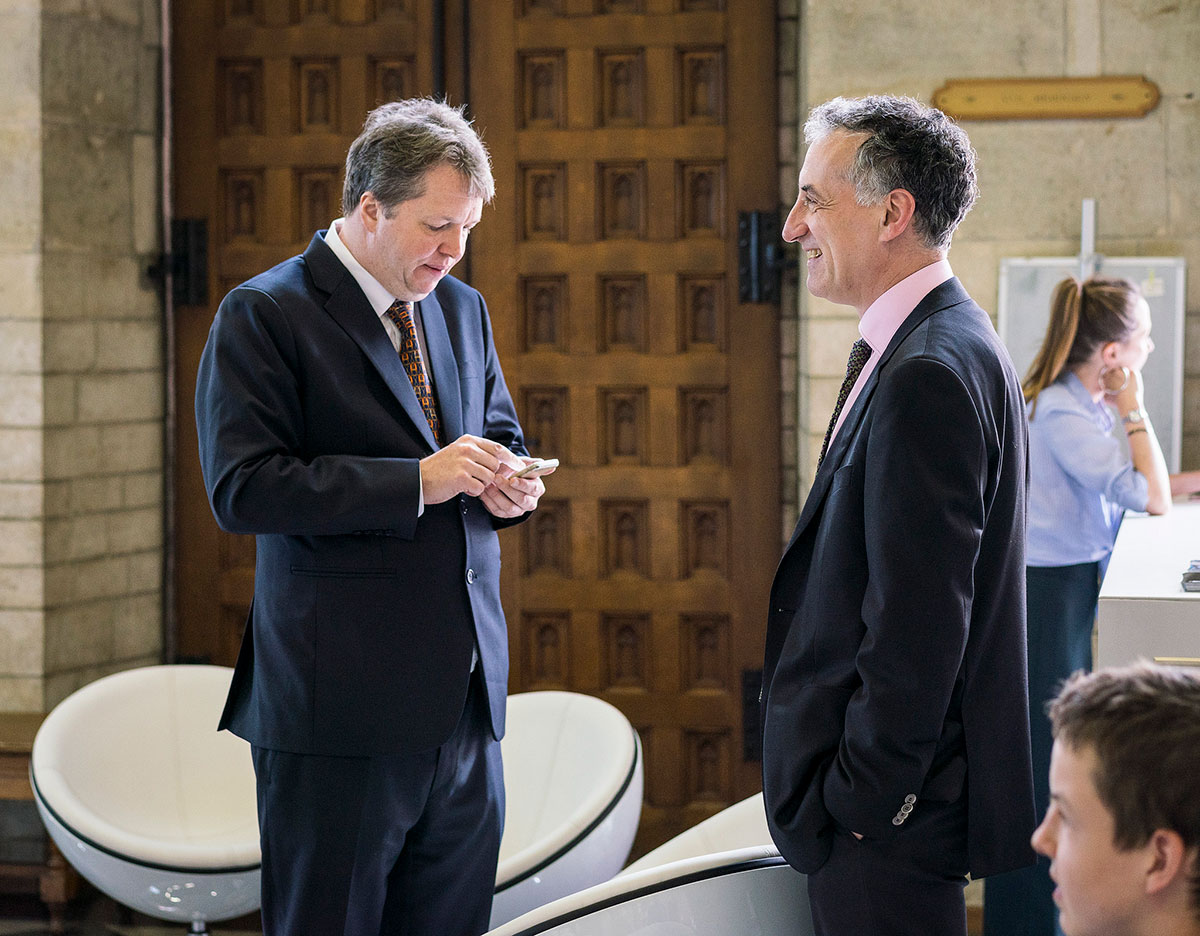
Short conversing with Pein in Leuven | Photo: Lennart Ootes / Grand Chess Tour
Short outlines some changes and reforms to FIDE that he would like to see, beginning with the funding model for the organisation:
"The most important thing that I would like to do is to invert the model of how FIDE is run. In fact, the current model is basically the exact opposite of how successful sporting organisations are run. They attract commercial sponsorship to the centre, so [for instance] FIFA is a very wealthy organisation and then FIFA distributes funds outwards. The model for FIDE is the Federations support the centre, and it’s a rent-seeking model. They occupy the space, and they simply tax everybody for it. So if you want to organise a rated tournament, you pay for that. You pay a euro per player, getting the thing rated. If you want to be an arbiter then you’re paying for that. If you want to be a trainer, you’re paying for that. It’s a rent-seeking model. They’re not contributing, they’re actually detracting and inhibiting chess activity. So this is the fundamental thing — to attract commercial sponsorship — and you cannot attract commercial sponsorship unless you can restore the reputation of the organisation."
"We have a fraction of the budget of cycling, for instance, it is a tiny fraction of the annual budget despite the fact that we have a 189 member Federations and literally millions of people who know how to play the game and 650 thousand people on the Elo list. Just talking about the Elo list, by the way, a normal thing to do is to get commercial sponsorship for the Elo list. You don’t charge people for getting things rated. When you have a database of 650 thousand often quite intelligent people there, in a particular interest group, companies are delighted to be associated with things like that."
Short has travelled to around 120 countries in the world and says he has seen the effect of rating fees in discouraging tournament organisers from rating their events, to the detriment of players. He relates a recent example of a tournament room in Nigeria bursting into spontaneous applause when it was unexpectedly announced that a blitz tournament would be rated.
[Update June 21: Blitz rating fees have been waived by FIDE on an ongoing basis since 2012. Short clarified in response to a follow-up question:
Apparently I made a mistake — there is an amnesty on the charging of blitz tournaments (which clearly many people are unaware of). My basic point is more than valid, although I was wrong on that specific point of detail.]
Makropoulos has been delegated the powers of the FIDE President since the end of 2015, and Short wonders why it took so long to recognize the danger to FIDE's finances by continuing to have Ilyumzhinov as the nominal President. He could and should have been removed long ago to avoid the banking issues FIDE has experienced this year, Short argues.
"What they should have done is force a vote and to get Kirsan removed because it was clear this was an existential threat to FIDE. They could have done it, but they procrastinated, and you saw them up until April 30th, 2018 — they were scrambling to put in arrangements at the last minute — and not very satisfactory arrangements either — to prevent them having the assets frozen. So that shows a lack of planning, a lack of foresight on their part. They have allowed Kirsan to lie through his teeth. You will recall he stepped down in order to clear his name in the US, and you may remember he made a lot of headlines saying he was going to sue the US government for 50 billion dollars. There is no such case. There never has been such a case. It was obvious there was never going to be such a case because there were no grounds for this, and FIDE — by FIDE I mean Makropoulos and the rest of that group — they have stood by him and not contradicted Kirsan. They promoted a fiction that he was attempting to deal with this particular problem, and that is one of the issues with the body — they knew damn well he wasn’t going to court, but they were just happy enough to pretend to the world that he was trying to clear his name."
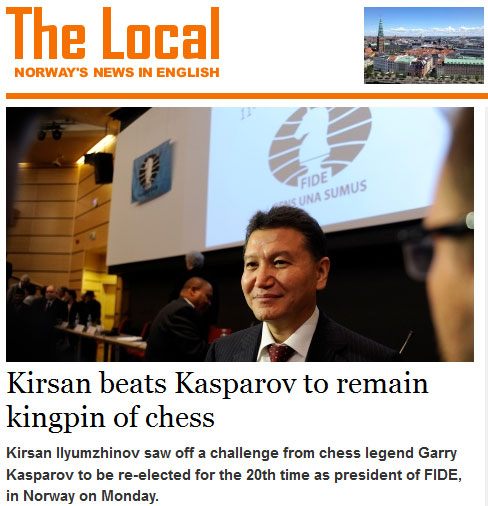 In 2014, Ilyumzhinov announced to the General Assembly in Tromso, Norway, that he intended to invest $20 million into the FIDE accounts. An unbelievable claim that proved to be untrue.
In 2014, Ilyumzhinov announced to the General Assembly in Tromso, Norway, that he intended to invest $20 million into the FIDE accounts. An unbelievable claim that proved to be untrue.
"When he got up in the General Assembly, in 2014, and said ‘if elected I will put 20 million dollars into the FIDE accounts today’, Makropoulos sits there, applauds with the rest of the assembly, and then he admitted — the exact term he used was — this was 'bullshit'. So they are dishonest. Makropoulos is a beneficiary of these lies and deceit, and he’s quite happy to encourage it."
Makropoulos' exact words describing Ilyumzhinov's declaration were, "What Kirsan told him there, is, 'Garry, if you want to bullshit, I can bullshit better'." The implication was that a similar promise to invest $10 million on the part of Kasparov's would-be Treasurer, Rex Sinquefield was not sincere. Sinquefield's sponsorship of chess, already at the time, was vast and it has only grown in subsequent years. He also spends multiples of that figure to influence politics in his home state of Missouri, so there was no reason to doubt or ridicule the 2014 pledge.
Among Short's other views, some of which are controversial, he makes clear that he has no plans to lobby for the alteration of the stalemate rule, despite advocating such changes seriously in the past.
"I have quirky views on things like stalemate — there is not going to be a rule change introduced — I just want to kill that one — because I've heard people discussing such things."
However, he is critical of the current blitz rules. He also wants to see more stringent qualifications and training requirements for FIDE Arbiters, suggesting that far too many are unqualified.
"They have used arbiting as a way of rewarding people. We see this at the Olympiad — we actually have lower quality arbiters at the Olympiad than we do for regular events because [while] some of them are there on competence grounds, a large number are there on political grounds, and they barely know the rules. The quality is very low. There are people who don’t know how to set the clocks. That is very much a minority, but there are a huge number of people who wouldn’t recognise a three-fold repetition if it occurred in front of their eyes. Just as in football you wouldn’t have some 120-kilogram 65-year-old guy appointed as a referee trying to keep up with the ball, in the same way with chess you ought to have people who can follow the game — at high speed, by the way — and make correct decisions."
Penalties for players found guilty of cheating should also be increased, says Short.
"I think there has been very little willingness to deal with measures like this…If you’ve got two cases, let’s say, during the course of your career, that should be a lifetime ban. And in fact, cheating in chess is much more serious than it is in many other sports, because — you know Lance Armstrong had all his laboratories and blood doping and all of that. You could give me all the same and I will never ever win the Tour de France — at least the guy could actually cycle. But with chess, you don’t actually need any real ability at all. I could teach my dog to win a tournament like this using a computer."
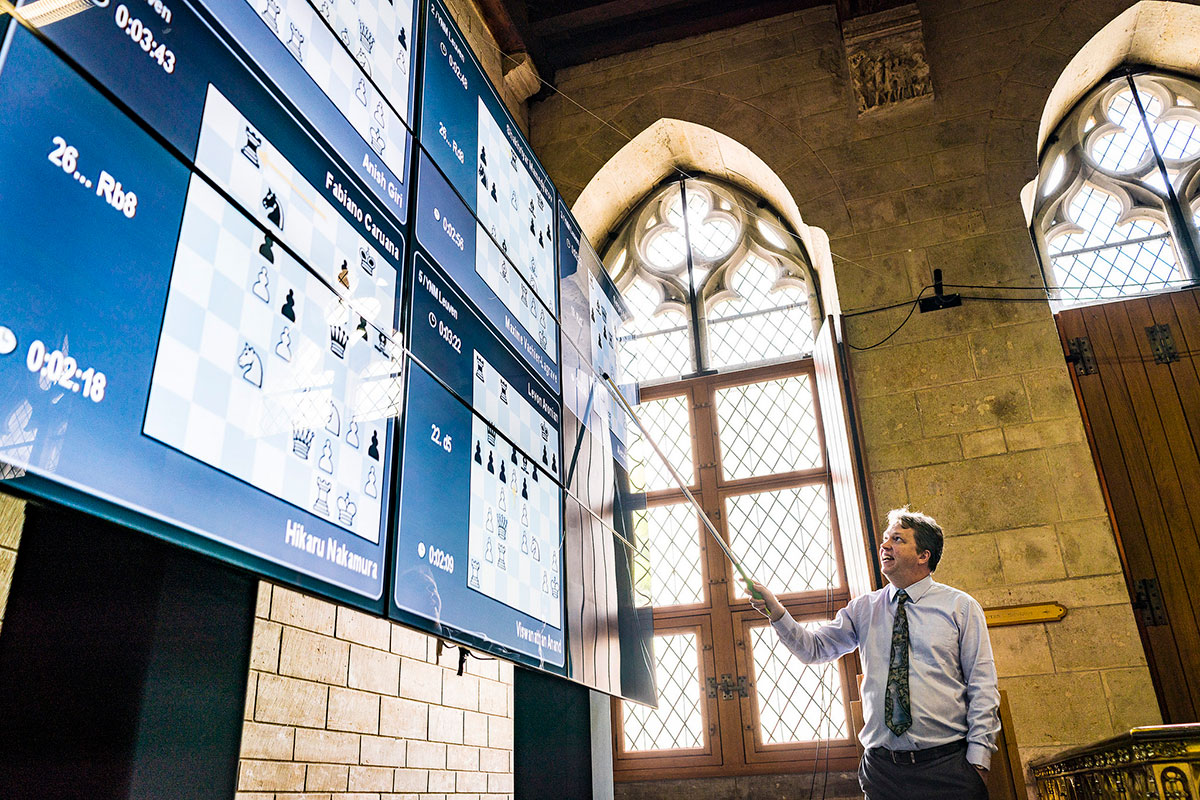
In his element | Photo: Lennart Ootes / Grand Chess Tour
Pre-arranged draws have been in the news lately, and Short says, he's strongly in favour of Sofia-Corsica rules (forbidding agreed draws), but that eliminating pre-arranged draws is difficult and, in fact, he has himself made them in his career. He doesn't consider it a pressing concern.
Short's complete ticket has yet to be announced but he stresses that he's primarily looking for people of integrity.
"Basically, chess has been used by people conducting their own business affairs, and that’s got to go. That whole thing has got to disappear. Chess should be paramount...In chess the officials consider themselves to be more important than the players. You don't get this in other sports, or at least they try to disguise it much better. The players are the stars and the players should be the stars."
Short now expects Ilyumzhinov to drop out of the race.
"I would be very surprised to see Kirsan running, with this latest announcement. It’s not impossible but it would be exceptionally foolish on Kirsan’s part to run against the will of the Kremlin. And I think we’ve had indications over the last month or so anyway — Kirsan has gone incredibly quiet. He’s been invisible. He’s been as invisible as Glen Stark...I am at least 90% sure we will not see Kirsan [continue running]."
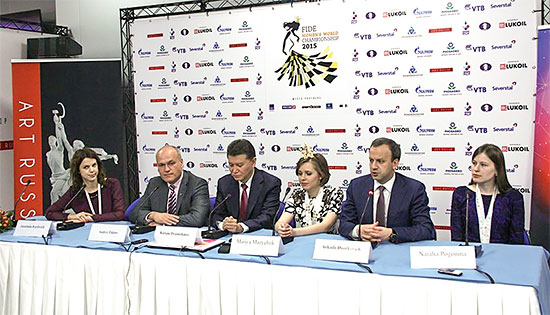
Dvorkovich (second from right) with RCF head Andrey Filatov and Ilymzhinov in 2015 | Photo: Eteri Kublashvili, Vladimir Barsky.
"We know already that Russian embassies have been active in contacting federations to support ‘our candidate’ [laughs]. We now know who their candidate is — Dvorkovich — but that has been recent, so we can expect that on a grand scale around the world. And this will also be a question for federations, whether they wish to give their vote to, basically, an agent of the Russian government, and to play along with Russian soft power, to allow them to control this body in perpetuity. It’s clear that this is their intention."
Garry Kasparov: "I don't think you can say that @advorkovich 'decided' to run for FIDE President. He was probably was told to do so. That's how things work in authoritarian regimes" pic.twitter.com/agx2vxeioK
— David Llada ♔ (@davidllada) June 16, 2018
Short's basic message is one of change. In addition to term limits, which Short is in favour of, he would also like to see the rules around voting by proxy tightened substantially to prevent abuse.
"Things have been wrong, they've been rotten, for far too long, and this is a golden opportunity to bring in real change, real ideas. There are so many reforms which are required."
He is not in favour of proposals to change the one-country-one-vote policy but he does suggest instituting minimum requirements that federations have elections, internal statues, and financial accounts. The details can be unique from case to case, but these criteria should ensure at least a modicum of democratic processes within federations, with ancillary benefits to FIDE's governance. He cites the chess federation of Japan as an example.
"The problems are not confined to a particular region. It’s all over. People sometimes say — I’ve heard the comment — that having statutes, that is discrimination against poor countries. Rubbish. Absolute rubbish. That’s just a bare minimum. You’ve got Japan, one of the richest, largest economies in the world, [yet it is] completely and utterly unrepresentative. And that sort of abuse must be stopped, and there’s been no willingness whatsoever — the system has been rotten for so long and it’s been encouraged to be rotten for so long."
The case of Gabon in 2014 is an instance of voter disenfranchisement, which Short hopes will not repeat itself this year.
"It’s the same principle like that of the school ground bully. A school ground bully, he goes there, and he beats up some small kid in plain view of everyone else, and he makes sure people see that he’s beating up the kid. And the message is very clear: ‘You mess with me, the same thing can happen to you’. And that is how these guys have been operating, Makro and Kirsan. So that has been the way things have been done.
What’s going to happen this time? We’ll see, we’ll see."
Nigel David Short is generally regarded as the strongest British grandmaster of the 20th century. Born on June 1st 1965 he started out as a chess prodigy, first attracting media attention by beating Viktor Korchnoi and Tigran Petrosian in simultaneous exhibitions at the age of ten and twelve years respectively. At the age of 14 he became the youngest IM in history, breaking Bobby Fischer’s previous record, and at 16 he came second (to Garry Kasparov) at the under 20 World Junior Championship in Dortmund.
A further conversation with Malcolm Pein about the FIDE politics and the Grand Chess Tour will follow shortly...